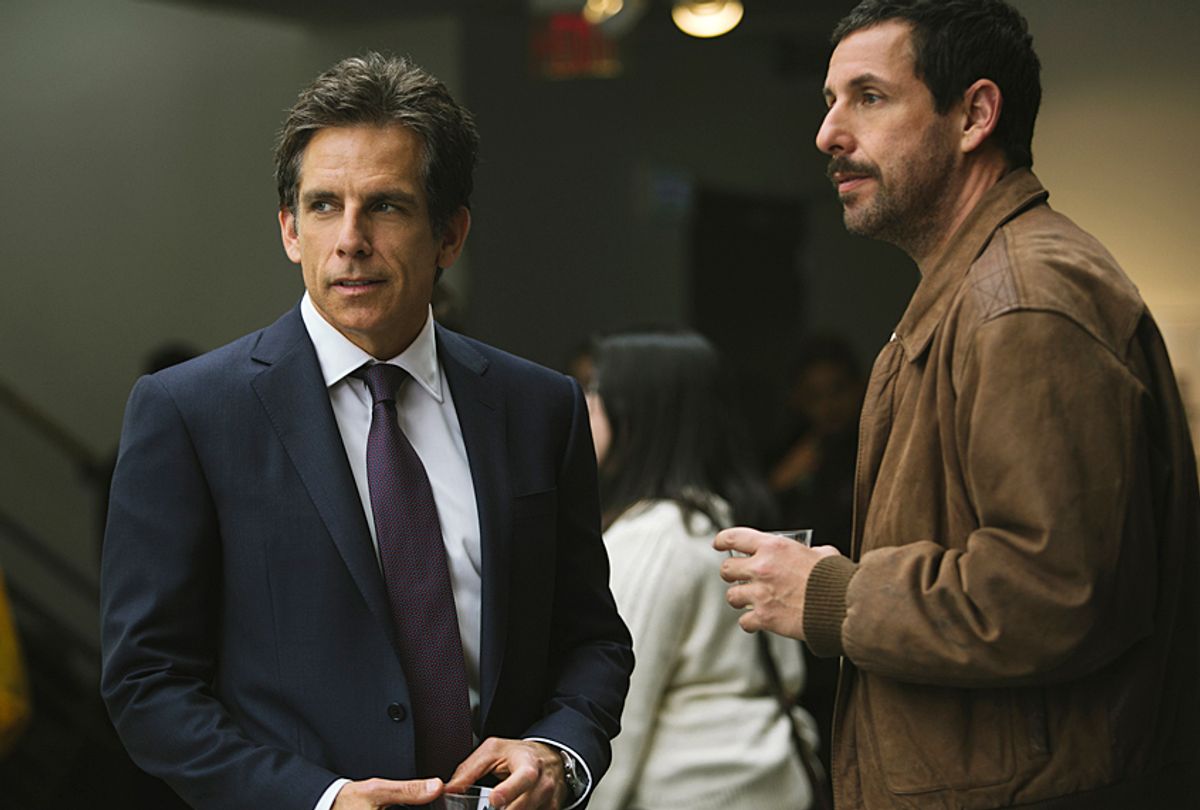The place is New York. The time is the present. And Adam Sandler is Danny Meyerowitz, a man who wears stubble with his mustache and a leather jacket with his cargo shorts. He’s searching for a parking spot. He passes one. His daughter, sitting in the passenger seat, tells him about a podcast she likes. He stops — no, a hydrant. A car beeps. “Shut the fuck up!” Sandler screams.
It’s then that the thought bubbles: Yes. Sandler’s back!
For a comedian whose name has been a punchline to a joke about bad comedies for more than a decade, it doesn’t take long for Adam Sandler to win over the audience in “The Meyerowitz Stories (New and Selected).” Nor does it take much. From that first scene, Sandler does his classic Sandler schtick: he’s a little bit pathetic one moment and he rages bright the next. But he’s doing it on 16mm film, in a literary Noah Baumbach movie. And the result is that coverage of the film has centered around how Sandler “triumphs,” how he is “a revelation,” how he is “miraculously great,” how “it’s time to admit that Adam Sandler is actually a good actor.”
I can’t argue with any of these superlatives. Sandler really is quite good in the film. But the way that the perception of Sandler seemingly changed in an instant is interesting within the context of “The Meyerowitz Stories,” because it’s what the film is all about.
Danny’s father is Harold Meyerowitz (Dustin Hoffman), a visual artist whose works are to be displayed in a retrospective at Bard College. The show serves as a cause for a family reunion. Danny’s sister Jean (Elizabeth Marvel) and his half-brother Matthew (Ben Stiller) visit. Baumbach introduces the siblings as though they are characters in a collection of short stories that have been anthologized. Replace Franny and Zooey with Danny and Matthew (and Jean), and there you have it — formally, at least.
The story of these siblings is the story of them and their father. Danny is the son who Harold never believed in and who didn’t amount to much professionally. Matthew is the golden child, who disappointed his father by becoming a wealthy accountant rather than an artist. And Jean is an afterthought. Each child’s perspective provides a different angle on Harold. He is disconnected with Danny and Jean, overbearing with Matthew. He’s both sensitive and narcissistic.
As Harold’s work is being displayed in a modest show at Bard, his friend and contemporary L.J. Shapiro’s (Judd Hirsch) work is the subject of a new show at The MOMA. Sigourney Weaver comes and tells L.J. how great the work is; meanwhile, no one recognizes Harold. He wears a tuxedo, but it makes him look out of place rather than important.
Even Harold’s children aren’t quite sure whether their father’s work is good or not. Danny thinks it is. Matthew thinks it isn’t. And then Danny second-guesses himself. “If he isn’t a great artist, that means he’s just a prick. But I think the work is good,” he says in one scene.
The viewer only gets a glimpse of a few pieces, and they look unremarkable but also vaguely professional. It isn’t supposed to be clear whether Harold was a good artist or not. The work itself is secondary to how it’s presented. Displayed at Bard, the perception is that the work is middling. If it were displayed at MOMA, though, the perception might be that the work is great.
In “The Meyerowitz Stories,” Baumbach probes subjectivity and the truth within popular narratives — about art and artists, but also about people and places. Harold might see Matthew as a success and Danny as a failure, but to the viewer, those narratives aren’t so clear cut. Danny is an attentive father and son; Matthew, though loving, is more absent.
And New York is equally open to interpretation. To the older generations, the city is a hollow, corporate shell of itself. When Danny looks for parking in downtown Manhattan, he recalls going dancing and laments all the construction underway. On Harold’s bookshelf, there are a series of big books with spines that read “New York 1900,” “New York 1930,” “New York 1960,” which might be the periods for which he’s nostalgic. Yet, for Danny’s college-aged daughter the city just is. And through Baumbach’s classic lens, the city looks as gorgeous as ever.
The most frequent comparison to the dramatic comedies Baumbach likes to make are the films of Woody Allen. But Baumbach also nods to some of the hallmarks of other more kinetic New York classics through the film’s motion. Characters drive to the small towns just outside of the city, like in “Something Wild.” And they run. Man, do they run. There’s something about characters running through the streets of Manhattan that’s always intoxicating — be it in “Marathon Man,” “After Hours,” or some of Baumbach’s previous films, like “Frances Ha” — and in “The Meyerowitz Stories,” it feels as though one Meyerowitz is always chasing after another. At separate points, both Sandler and Stiller are tasked with running down Dustin Hoffman, who at 80, can still move.
I suppose it’s subjective whether “The Meyerowitz Stories” is a good work of art or not. But all of the film’s stars shine, it’s beautifully shot, it’s in turns hilarious and touching and the literary conceit pays off. So I’ll wager that it doesn’t matter whether you see the film in a theater, on Netflix (available Thursday, Oct. 12) or in the MOMA. The quality of Noah Baumbach’s latest isn’t contingent on critical narratives or the perception that comes along with presentation, and it shouldn’t be that hard to parse.

Shares